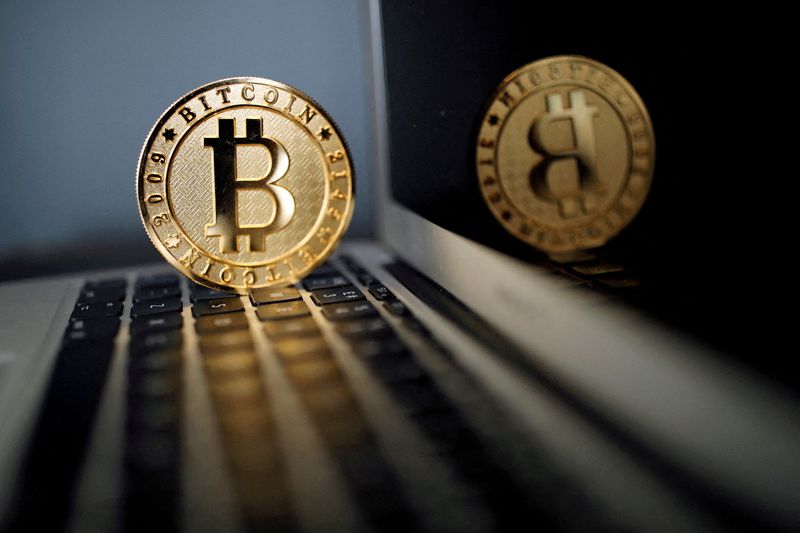By Suzanne McGee
(Reuters) - Crypto enthusiasts hailed the approval of U.S. bitcoin exchange-traded funds as the birth of a new asset class, but broadening acceptance of the famously turbulent cryptocurrency beyond its true believers could prove challenging.
A decade in the making, the ETFs offer investors access to spot bitcoin prices, avoiding the risks associated with holding bitcoin directly in a digital wallet, ranging from hacking to fraudulent behavior by crypto exchanges.
Estimates of likely first-year inflows vary widely, from $5 billion to $100 billion. Some market participants have compared the products to the SPDR Gold Shares (NYSE:GLD) ETF, which gave a much broader range of investors access to the precious metal when it launched in 2004 and pulled in more than $1 billion in its first three trading days.
Many of the 11 approved ETFs are expected to start trading on Thursday morning.
Cathie Wood, founder of Ark Investments, called it "a truly new asset class.”
One of the ETFs approved by the Securities and Exchange Commission was designed by Ark in tandem with 21Shares, a digital assets investment firm that already operates a crypto ETF in Britain.
"We're not thinking about profit maximization as much as enabling more and more people to access what we think is a new asset class," said Wood, who made her name creating actively managed ETFs that bet on so-called disruptive technologies ranging from electric vehicles to bitcoin trading.
Whether the new ETFs earn bitcoin a place at the table alongside more traditional asset classes such as stocks, bonds and commodities could well depend on how successful Wood and other issuers - including BlackRock (NYSE:BLK), Fidelity and Van Eck - are in helping the broader investment community overcome its wariness about the risk factors that take up dozens of pages in each ETF's regulatory filings.
Bitcoin's short history has seen several dizzying rallies followed by wrenching drops amid periods of decline sometimes dubbed "crypto winter." Scandals such as the implosion of crypto exchange FTX in 2022 have also added to investors’ wariness, though proponents have said some of the risk could be mitigated through ETFs, which are listed on tightly-regulated stock exchanges.
That volatility has heightened their appeal as primarily speculative investments, although they were originally created as an alternative to fiat currencies established by and backed by a governments.
Bitcoin, which came into existence in 2008, has a far shorter track record than other asset classes that have spawned wildly successful ETFs, such as gold. That makes it difficult for investors to determine how it will trade over multiple economic cycles.
Jeff Schwartz, president of Markov Processes International, a fintech firm that advises wealth and asset managers, drew a parallel between bitcoin and emerging markets and commodities, two asset classes that gained traction in investors’ portfolios in the 1990s and early 2000s.
Those "were asset classes far better understood by most investors than bitcoin is," Schwartz said. Nevertheless, "allocations were capped at a very low level (at the time), out of prudence."
Many expect the bulk of the investment community to follow suit and make only tentative forays into bitcoin ETFs. But even small allocations among a wide pool of investors could add up to billions in inflows: Standard Chartered (OTC:SCBFF) analysts this week said the ETFs could draw $50 billion to $100 billion this year alone, potentially driving the price of bitcoin as high as $100,000.
"Despite the interest in the crypto market, investors won't allocate a significant share of their portfolio in cryptos,” said Ruslan Lienkha, chief of markets at fintech platform YouHodler. But "even a small percentage of a portfolio specifically of institutional investors can boost crypto market capitalization."
Allocating 1% or 2% of a portfolio to spot bitcoin ETFs "shouldn't create too many issues or too much risk" for many investors, said Sandy Kaul, head of digital assets and industry advisory services at Franklin Templeton. She added investors are hungry for something new as "they're worried about real estate, unsure about bonds and stocks."
Proponents of bitcoin as an asset class also point to another much-touted property: its finite supply. The supply of 21 million bitcoins is expected to be fully mined by 2140, in theory making bitcoin resistant to inflation, a property that some investors also attribute to gold.
"Bitcoin is a truly non-inflationary asset," analysts at Invesco, one of the firms that received ETF approval on Wednesday, said in a report last year. Investment views about Bitcoin are often centered around this idea of scarcity.
Still, it might take a lot of convincing to change the mind of skeptics such as Robert Arnott, founder and chairman of asset manager and consultancy Research Affiliates.
"Bitcoin isn't an asset; it's not even like currency," said Arnott, who has studied the evolution of asset allocation and views bitcoin as closer to investments such as art and fine wine rather than stocks and bonds.
"I view it as a speculative vehicle," he said. "There's nothing wrong with speculative vehicles" as long as investors understand what they are getting into, Arnott added.
